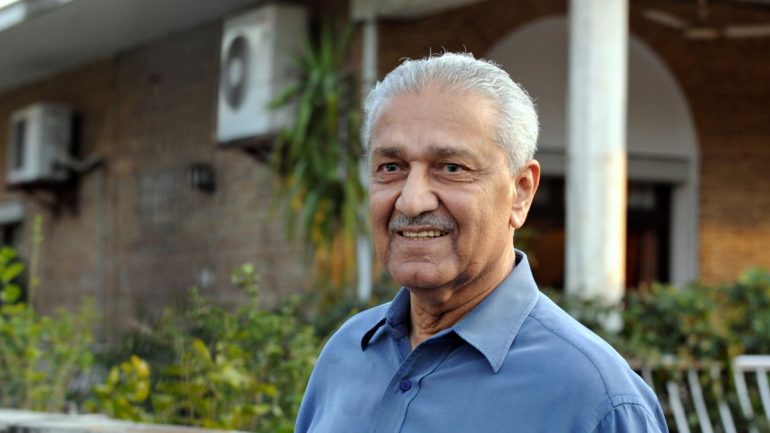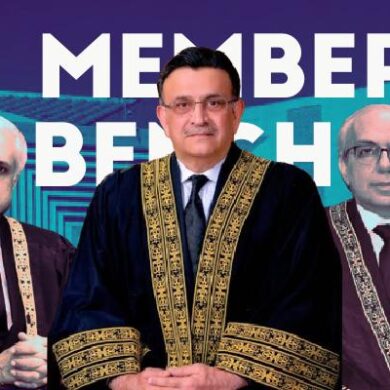Dr. Abdul Qadeer Khan, a nuclear scientist, announced 11 hours before his death that he would take the defective admittance tests for medical and dental universities to court.
Dr. Khan said, “I am going to file a petition on Monday in Islamabad High Court to challenge a faulty MDCAT (medical students’ admission test) because it has destroyed the future of hundreds of thousands of students.”
The remarks of DR. AQ Khan on the matter were made on Saturday (9th October). This demonstrated his genuine empathy for the plight of the common man, and, in this case, the agony of candidates who were advised by the PMC to disregard the preliminary results.
Furthermore, he was of the view that the government had implemented a flawed Medical and Dental Colleges Admission Test (MDCAT) that jeopardized medical students’ futures in the country.
According to a media report, the PMC revealed that over 125,000 candidates, or about 65 percent of the total did not pass the exam.
This scribe received a telephone call from Dr. Khan at 6.28 p.m. on Saturday, in which the nuclear physicist expressed concern over the future of medical students and stated that he had decided to dispute the issue in the IHC.
Dr. Khan, speaking in a strained tone, stated that he had returned home after receiving Covid 19 therapy in the hospital, but that he was still unwell. He added, “I have pain in my whole body.”
It is unclear whether his family would pursue his plea now that the scientist who helped turn the country into an atomic power is no longer alive.
Dr. Khan had already expressed his dissatisfaction with the current leadership for failing to inquire after his health while he was hospitalized owing to Covid-19. Dr. Khan expressed his disappointment with the federal government’s stance in a recent letter to incumbent Sindh Chief Minister Murad Ali Shah.
Moreover, he wrote, “Such a nice feeling that the PM & CM of Punjab, KPK, and Balochistan are waiting to hear the good news of my demise.”
Dr. Khan, who was born in the Indian city of Bhopal in 1936, has had a turbulent existence, but he found himself in hot water after Pakistan conducted nuclear testing in 1998. Since then, he and his Dutch wife Henny Khan have had to live a terrible life in “protective” custody at his own E-7 property.
Dr. Khan is known among his friends and followers as the “good morning” man since he used to send good wishes massages before sunrise after offering Fajr prayer. Many people were surprised when he didn’t answer his phone on Sunday, as he couldn’t send out well wishes before the news of his death came at 7 a.m.
He will be recognized not only for designing Pakistan’s nuclear program but also for his contributions to education and social welfare. According to family sources, he and his wife ran more than a hundred educational and social welfare institutions around the country, particularly in rural areas.
Dr. Khan and his family moved to Pakistan after the subcontinent was partitioned in 1947. He graduated from Karachi University with a science degree in 1960, then went to Berlin to study metallurgical engineering before continuing his education in the Netherlands and Belgium.
In 1974, he joined the Pakistan nuclear program, which was envisioned by then-prime leader Zulfikar Ali Bhutto, and in 1976, he formed the Khan Research Laboratories, where he served as head scientist and director for many years.
When India conducted nuclear tests in 1998, the entire nation awaited a strong response from Pakistan, and the nuclear tests were finally carried out under his supervision near Chagai, Balochistan.
Dr. Khan was a rare national hero who got three top civic awards for his contributions to the country’s defense and made it unbeatable. They were Hilal-i-Imtiaz, which he received in 1989, and Nishan-i-Imtiaz, which he received twice, once in 1996 and once in 1999.
He has written numerous research papers and publications. Advances in Physical Metallurgy (in English, German, and Dutch) was published in 1972, Metallurgical Thermodynamics and Kinetics (in English, German, and Dutch) was published in 1983, and Dr. A.Q. Khan on science and education was published in 1997.



